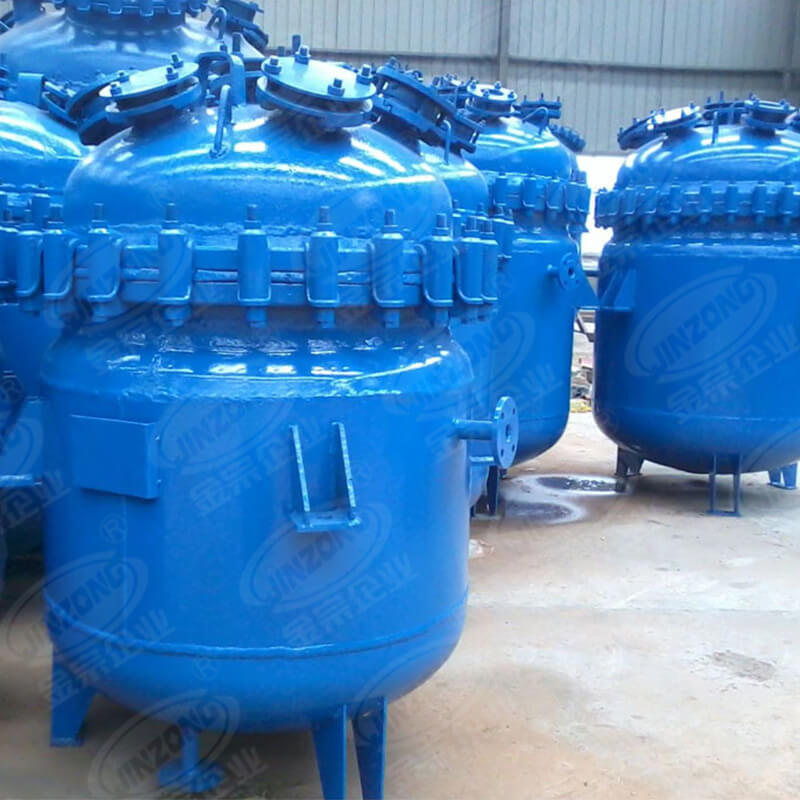Guangdong Jinzong Machinery Co., Ltd.
Contact Sales at JuJiao.
Enamel: The metal surface coating multilayer porcelain glaze, both physical and chemical reaction of the porcelain glaze and metal combination of a layer of composite materials, enamel metal includes: copper, aluminum, low-carbon steel .... etc, mainly used in decoration and jewelry, building materials surface decoration and anti-corrosion, bathtubs, water heaters, water tanks and other daily products;
Enamel reaction kettle is the high silicon content of the glaze sprayed on the metal tire surface, through the 900 Shan around the high-temperature roasting, so that porcelain glaze is dense on the surface of metal tires made, so it has similar glass chemical stability and metal strength of the dual advantages.
Enamel reactor is widely used in chemical, pharmaceutical, dyestuff, pesticide, organic synthesis, petroleum, food manufacturing and defense industry and other industrial production and scientific research in the reaction, evaporation, concentration, synthesis, polymerization, saponification, sulfonation, chlorination, nitrification, etc., in place of stainless steel and non-ferrous metal equipment.In order to ensure the normal use of glass-lined equipment, its main performance and installation, the use of notes are as follows:
1. Use pressure: 0.2--0.4mpa
2. Alkali-resistant: glass-lined alkaline solution is less corrosive than acid solution. But will I plant glass samples placed in 1N sodium hydroxide solution corrosion, test temperature 80 Shan time 48h. The corrosion rate is 6.76G.
3. Acid resistance: All kinds of organic acids, inorganic acids, organic solvents have a good corrosion resistance. If I plant the production of glass-lined 20 solution in the boiling 48h, corrosion rate of 0 9g M2.
4. Operating Temperature: Glass-lined equipment heating and cooling, should be slow. I plant the production of wholesale glass lined reactors with a temperature of 0-200 Shan, temperature-resistant change ≥ 200 Shan.
5. Porcelain layer Thickness: The porcelain layer thickness of glass equipment is 0.8-2 0mm, the porcelain layer thickness of glass-lined equipment accessory is 0.6-1 8mm.
6. Impact Resistance: the smaller the internal stress of the glass, the better the elasticity, the greater the hardness, the higher the flexural compressive strength, the better the impact resistance.
7. Voltage-resistant: glass-lined with good insulation, when the glass in the specified thickness of 20KV high-frequency EDM inspection of the porcelain layer, high-frequency EDM can not penetrate the porcelain layer.

Glass lined reactor: a special performance glazed glaze that is fired at high temperature on a metal substrate through a furnace 820 °c or so, metal matrix refers to: a variety of petrochemical equipment has a certain strength of carbon steel, stainless steel containers, pipelines, etc., mainly used in chemical industry, low temperature, with pressure, corrosion and other reactions, storage ... Anti-Corrosion equipment, collectively known as glass lined equipment!
Glass line equipment cannot be used under the following conditions:
(1) Any concentration and any temperature of HF can not be corrosion-resistant;
(2) Lye: the ph is greater than or equal to 12, the temperature is greater than 100 Shan, can not withstand corrosion.
(3) Hydrochloric acid: concentration 10-20, temperature is greater than 150 Shan, corrosion is strong;
(4) Sulfuric acid: concentration 10-30, temperature greater than 200 Shan can not withstand corrosion;
(5) Phosphoric acid: The concentration of more than 30%, temperature greater than 180 Shan when the corrosion is strong;
The corrosion resistance of glass lined stainless steel reactor is based on the contact of the glass liner with the medium to form a layer of silicone-oxygen protective film which prevents the media from corroding the tank. When the glass-lined contact with alkali liquid, the surface can not form a silicone-oxygen protective film, resulting in a continuous deep erosion of lye into the glass layer, and the higher the alkali concentration, the higher the temperature of the degree of erosion is greater. The boiling-State alkali solution has the greatest erosion ability.
Copyright © 2025 Guangdong Jinzong Machinery Co., Ltd. | All Rights Reserved
We are here to help you! If you close the chatbox, you will automatically receive a response from us via email. Please be sure to leave your contact details so that we can better assist